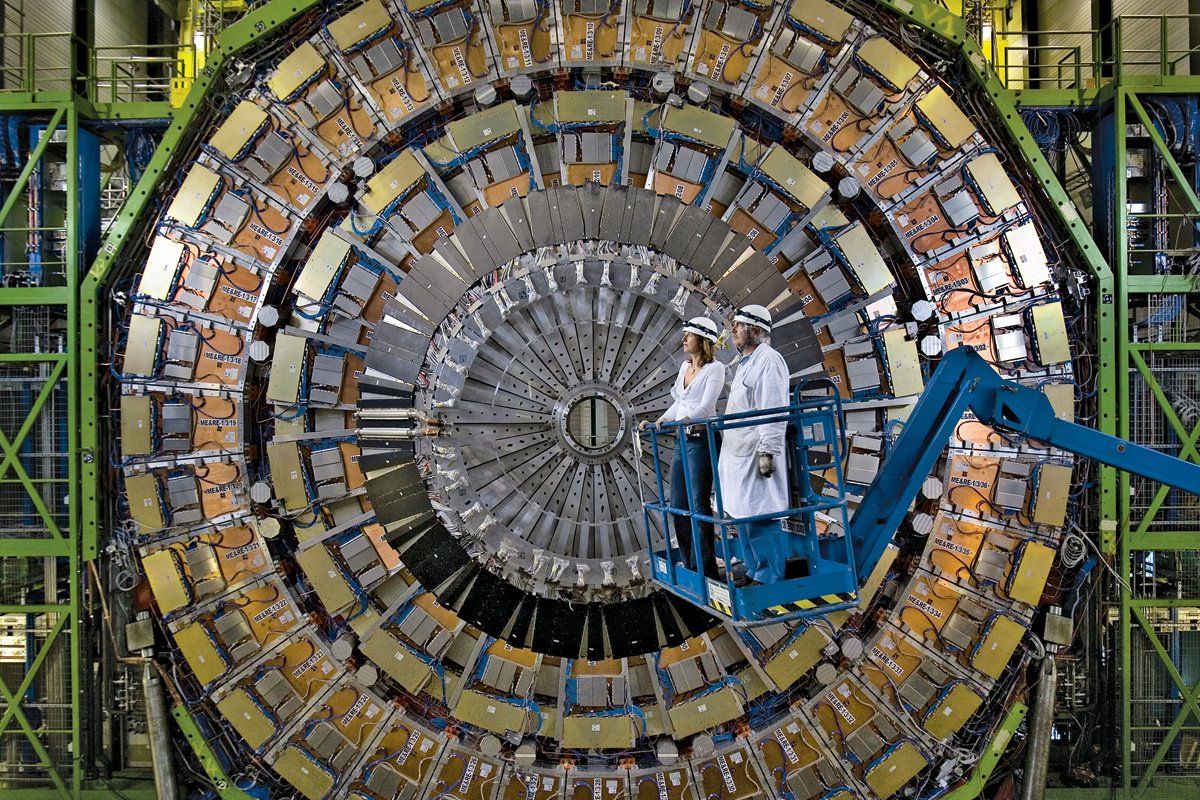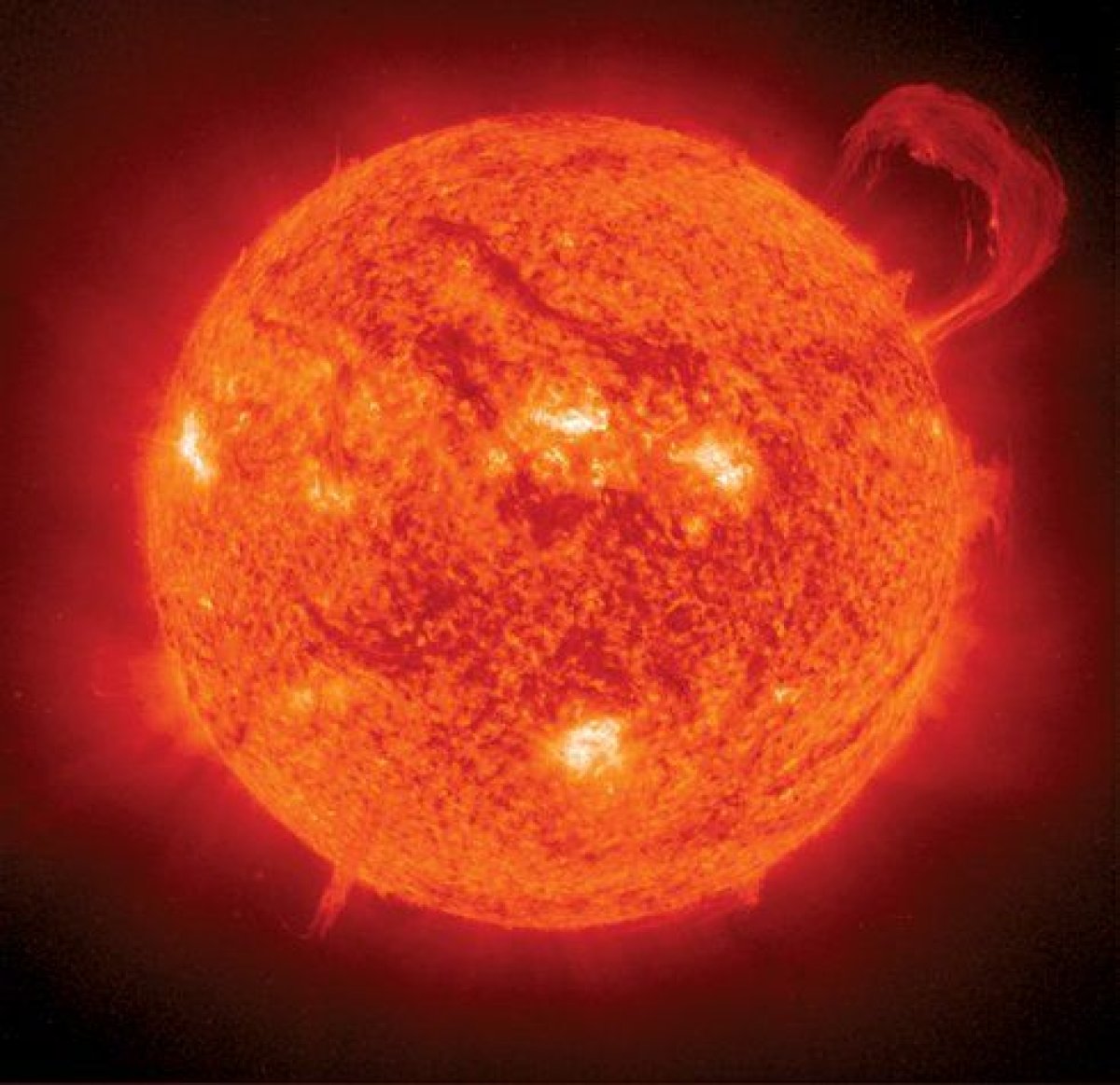
The excitement from Europe earlier this month was palpable. Experiments had hinted at the discovery of a new fundamental ingredient of nature—a particle called the Higgs boson. This wasn't just any particle, but one that could potentially tell us that the theory physicists have been using to understand matter's fundamental building blocks for the last half century is premised on a secure foundation.
Even nonscientists—those for whom terms like "Higgs field," "gigaelectronvolt," and "hadron" are almost a foreign language—were thrilled, inspired by the notion that we are on the verge of unraveling mysteries previously beyond our grasp.
"Hadron," in fact, refers to particles that interact through one of the four forces of nature known as the strong nuclear force. The Higgs-boson experiments are taking place at the Large Hadron Collider, an enormous particle accelerator crossing the French-Swiss border. In the LHC's underground labyrinth, scientists can observe the collision of protons—a type of hadron—that have been accelerated to nearly the speed of light. These protons collide a billion times a second in a tiny region smaller than a human hair. When they do, they can turn into energy, as predicted by Einstein's theory, and that energy can then create new types of matter, never before seen.
On the afternoon of Tuesday, Dec. 13, in Geneva, spokespeople from the two major LHC experiments, called ATLAS and CMS, announced the status of their respective searches for the Higgs boson. Named for the British physicist Peter Higgs, the particle—if it exists—would tell us that the Higgs mechanism, the half-century-old idea for understanding how elementary particles acquire their masses, is correct. Those masses are essential to much of the structure we see in the world. If electrons didn't have mass, atoms wouldn't form. And then neither would galaxies, planets, or life. There's a lot more to all this structure than the Higgs mechanism alone, so the name "God particle," coined by the Nobel Prize–winning physicist Leon Lederman and relished by the popular media, might be a bit misleading.
Nonetheless, the Higgs mechanism is critical to today's theory of the basic elements of matter. Higgs and his colleagues theorized that space itself contains a sort of charge. Elementary particles acquire mass through their interaction with the charge (you might think of this charge as a traffic camera that slows down traffic even without any actual policemen to stop the cars). Space isn't filled with Higgs-boson particles—you need a collider such as the LHC to make those—but the Higgs boson is the telltale sign that there really is such a "charge" in space.
But here's the catch: the Higgs mechanism hasn't yet been vindicated by experiments. The reason the news from Geneva was so momentous was that scientists at the LHC might have come one step closer to proving it. Such a discovery won't turn our world around tomorrow. But basic science is like that. For all the deep and fundamental truths we learn about nature, it's rarely clear right away what the implications will be. When electricity was discovered, no one knew the globe would fairly quickly be blanketed with lightbulbs. When quantum mechanics was discovered, no one anticipated semiconductors and the ensuing electronics revolution. It's still unclear what a discovery of the Higgs boson will mean in 10 or 20 or 100 years' time, but cultures where people learn more about their world, and science is valued, seem to fare well in the end.
I listened to the Higgs announcements over a choppy Internet connection that I spliced with occasional glances at Twitter, where people who could actually hear what was going on gave a rolling status report of the talks. Although it was 5 a.m. for me in California, the early-morning wake-up was worth it. For me, a physicist whose work for the past quarter century has focused on the mysteries of matter, any clue about the Higgs boson would provide valuable and long-awaited insight. The first talk was by Fabiola Gianotti, the remarkable leader of the ATLAS experiment, who presented evidence of a Higgs boson decaying into photons and also into other particles. She kept advising caution, which she would belie by periodically breaking into a smile as she spoke. Listening to her, I felt the excitement, too. For a moment I even believed the Higgs boson might really have been found.
But my hope might have been premature, as I learned in the CMS talk that followed. Alas, the CMS evidence for a particle was much weaker. Its researchers couldn't rule out the Higgs boson. But they couldn't say they'd seen it, either.
The good news is that with four times the data coming next year (the LHC has improved remarkably with each year of running), even the most cautious and skeptical among us are confident we'll know the answer—at least about the Higgs boson—by next year.

And if the hints at discovery prove false, it won't mean the whole story is wrong—it will more likely mean that a more subtle theory is responsible for the "charge" in space that gives particles mass. The great irony is that for physicists, not finding a Higgs boson would be spectacular, pointing to something potentially more interesting. Future investigations might demonstrate either that an exotic Higgs-boson-like particle has other ways to decay than those in the standard model or that the Higgs boson might be a more complex object made up of smaller ingredients, much as a proton is made up of smaller fundamental particles called quarks.
Galileo first realized the value of experiments: artificial situations a scientist sets up to study some phenomenon. He said they went far beyond making new discoveries or proving an idea correct; just as important was ruling out ideas. I recently moderated a talk among four Nobel Prize winners at the Museum of the Rockies in Montana. A theorist on the panel thanked the experimenter to his right for finding the particle that verified his theory and earned him his Swedish prize. The experimenter's response was that he shouldn't thank him—he would have been just as happy to have disproved the theory. Knowing what is and isn't realized in nature will guide us on our searches as we move forward, and will help us address still deeper questions about space and the matter of which the universe is composed.
Uncommon Knowledge
Newsweek is committed to challenging conventional wisdom and finding connections in the search for common ground.
Newsweek is committed to challenging conventional wisdom and finding connections in the search for common ground.
About the writer
To read how Newsweek uses AI as a newsroom tool, Click here.








